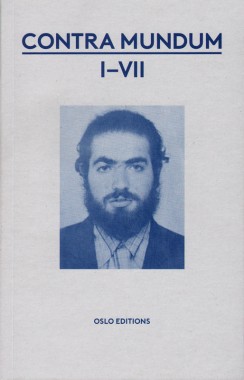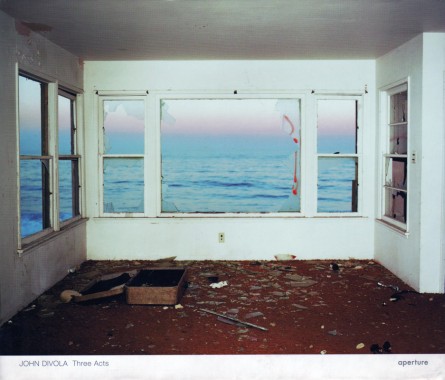Contra Mundum I-VII
Contra Mundum I-VII
Softcover, 224 pp., offset 1/1, 140 x 220 mm
Edition of 1000
ISBN 978-0-9830773-0-5
Published by Oslo Editions
$18.00 · out of stock
The inaugural volume from Oslo Editions, Contra Mundum I-VII, documents a series of talks held at the Mandrake in Los Angeles on the theme of “contra mundum” or “against the world.” Taking its cue from Evelyn Waugh’s novel Brideshead Revisited, Contra Mundum posits the world-making potential of (anti)sociality as a subject position and the value of a notion of collectivity grounded in “association without relation.” So doing, the book considers a diverse range of topics, including the furniture of Donald Judd, Private Issue New Age music, animal subjectivity, misanthropy and the trope of self-banishment in Shakespeare, apocalypticism and the zombie film, pirates from Blackbeard to Somalia, and the post-punk vocalist Mark E. Smith. Featuring contributions from artists Rupert Deese, Elad Lassry, Anthony Pearson, and Frances Stark, and critics Aaron Kunin, Matthew Taylor Raffety, and Evan Calder Williams.
Three Acts
John Divola, Three Acts
Hardcover, 144 pp., offset 4/duotone, 11 x 9.25 inches
Edition of 2000
ISBN 9781931788953
Published by Aperture
$50.00 ·
In 1973, California artist John Divola began the first of three highly ambitious and original bodies of work that form Three Acts, the first book dedicated to them. His Vandalism series comprises black-and-white photographs of interiors of abandoned houses. Entering illegally, Divola spray-painted markings that referenced action painting as readily as the graffiti that was then becoming a cultural phenomenon. For the following year’s Los Angeles International Airport Noise Abatement series, he photographed a condemned neighborhood bought out to serve as a noise buffer for new runways, focusing on evidence of previous unsanctioned entries by other vandals. His final work, Zuma, documents the destruction of an abandoned beachfront property by the artist and others, as it deteriorates frame by frame and eventually burns. Divola has much in common with artists such as Bruce Nauman and Robert Smithson who have used photography to investigate other topics. He describes his innovative practice succinctly: “My acts, my painting, my photographing, my considering, are part of, not separate from, this process of evolution and change. My participation was not so much one of intellectual consideration as one of visceral involvement.”


